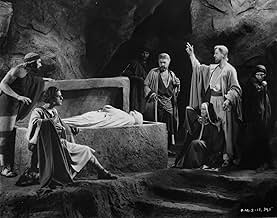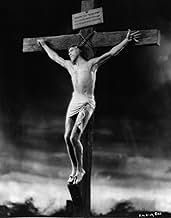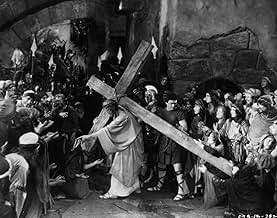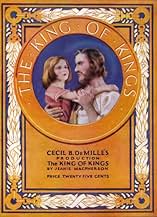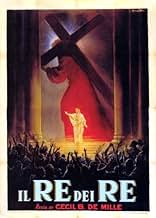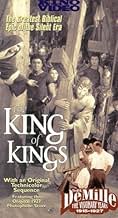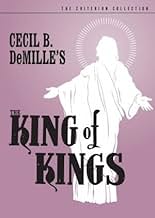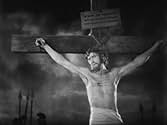IMDb RATING
7.3/10
2.6K
YOUR RATING
Jesus Christ faces religious and political oppression during his ministry and in the days before his death and resurrection.Jesus Christ faces religious and political oppression during his ministry and in the days before his death and resurrection.Jesus Christ faces religious and political oppression during his ministry and in the days before his death and resurrection.
- Awards
- 5 wins total
- Director
- Writer
- All cast & crew
- Production, box office & more at IMDbPro
Featured reviews
10blue-7
I first experienced Cecil B. DeMille's beautiful telling of the Life of Christ, his 1927 THE KING OF KINGS, in a local theatre in the late 1950s. It impressed me then as a teenager and it impresses me even more now, having just experienced a special viewing of the double disc DVD that is being released on December 7, 2004 under The Criterion Collection label.
I purchased a 16mm print of this film many years ago as well as buying the Criterion Laser Dics release a few years back, so I am well versed in this classic. Until now, everything shown theatrically, on 16mm, VHS tape and Laser Discs has been of the re-edited version that DeMille prepared in 1928, a year after the film played its roadshow engagements. Millions of people the world over have seen the shorter 112 minute cut, which is included on the Criterion disc with both the original Hugo Riesenfeld score (and sound effects) as issued in 1928, and an outstanding newly recorded pipe organ score by Timothy J. Tikker, done especially for this release.
For years I have been aware that the roadshow version as shown at the Grauman's Chinese Theatre in LA and at the Gaiety in NY, ran 155 minutes, some 37 minutes longer then I had ever seen it. From James D'Arc at the Brigham Young University Archives (which houses the DeMille collection) I learned that the full length version still existed and was in the possession of the DeMille family. That complete version is now the highlight of the Criterion DVD release and it is MARVELOUS!
I've always thought highly of DeMille's THE KING OF KINGS -- but now seeing it in this wonderfully preserved full-length print, complete with an outstanding original orchestra score by Donald Sosin, I can say without hesitation that it is a more spiritually uplifting experience in this version then it ever was in the fine shorter cut. This is a MASTERPIECE, not only of the silent cinema, but of all-time!
And that's not all -- the EXTRA's included on the two DVD's are also a marvel. There is almost 15 minutes of priceless behind-the-scenes footage on the set of the film. You'll see DeMille directing a huge cast and at times view three cameras being hand-cranked. There are shots of D.W. Griffith and Douglas Fairbanks visiting with DeMille on set. There are production and costume sketches by renowned artist Dan Sayre Groesbeck as well as a stills gallery of rare production and publicity photos. The original illustrated theatre program and press book are pictured also -- and there's more. In short this is the finest DVD ever released on a film from the silent era, even surpassing Fox's marvelous job on F.W. Murnau's SUNRISE (also a 1927 release).
In my opinion, DeMille's THE KING OF KINGS in this full version is the finest rendering of the Life of Christ ever put on film! Criterion, known as the leader of fine DVD's, has done it again. Don't hesitate on picking up a copy of this if you love great movies and want a spiritual experience!
I purchased a 16mm print of this film many years ago as well as buying the Criterion Laser Dics release a few years back, so I am well versed in this classic. Until now, everything shown theatrically, on 16mm, VHS tape and Laser Discs has been of the re-edited version that DeMille prepared in 1928, a year after the film played its roadshow engagements. Millions of people the world over have seen the shorter 112 minute cut, which is included on the Criterion disc with both the original Hugo Riesenfeld score (and sound effects) as issued in 1928, and an outstanding newly recorded pipe organ score by Timothy J. Tikker, done especially for this release.
For years I have been aware that the roadshow version as shown at the Grauman's Chinese Theatre in LA and at the Gaiety in NY, ran 155 minutes, some 37 minutes longer then I had ever seen it. From James D'Arc at the Brigham Young University Archives (which houses the DeMille collection) I learned that the full length version still existed and was in the possession of the DeMille family. That complete version is now the highlight of the Criterion DVD release and it is MARVELOUS!
I've always thought highly of DeMille's THE KING OF KINGS -- but now seeing it in this wonderfully preserved full-length print, complete with an outstanding original orchestra score by Donald Sosin, I can say without hesitation that it is a more spiritually uplifting experience in this version then it ever was in the fine shorter cut. This is a MASTERPIECE, not only of the silent cinema, but of all-time!
And that's not all -- the EXTRA's included on the two DVD's are also a marvel. There is almost 15 minutes of priceless behind-the-scenes footage on the set of the film. You'll see DeMille directing a huge cast and at times view three cameras being hand-cranked. There are shots of D.W. Griffith and Douglas Fairbanks visiting with DeMille on set. There are production and costume sketches by renowned artist Dan Sayre Groesbeck as well as a stills gallery of rare production and publicity photos. The original illustrated theatre program and press book are pictured also -- and there's more. In short this is the finest DVD ever released on a film from the silent era, even surpassing Fox's marvelous job on F.W. Murnau's SUNRISE (also a 1927 release).
In my opinion, DeMille's THE KING OF KINGS in this full version is the finest rendering of the Life of Christ ever put on film! Criterion, known as the leader of fine DVD's, has done it again. Don't hesitate on picking up a copy of this if you love great movies and want a spiritual experience!
What a masterpiece! Visually stunning and deeply moving, even for the non-religious. DeMille was at his best in the silent era, and I have never seen the story of Christ told so beautifully. With more than a passing nod to nineteenth century Biblical painting, DeMille recreates the last days of Jesus' life in painstaking detail. He takes some liberty with chronolgy, and there is his trademark combination of religious fervour and delicious decadence. But the passion and sincerity are so strong that I'll be surprised if you don't shed a tear once or twice. And Joseph Schildkraut is stunning as Judas.
Eye-popping sets and superb photography combine with huge crowds of extras and excellent costumes to create one of the great epic films. And dig that opening orgy scene involving a scantily clad Mary Magdalene, a couple of old men, a leopard and a hunky charioteer leading a team of zebra! Wow! The first shot of Jesus is also cinema magic, an unforgettable moment. This film is superb.
Eye-popping sets and superb photography combine with huge crowds of extras and excellent costumes to create one of the great epic films. And dig that opening orgy scene involving a scantily clad Mary Magdalene, a couple of old men, a leopard and a hunky charioteer leading a team of zebra! Wow! The first shot of Jesus is also cinema magic, an unforgettable moment. This film is superb.
Cecil B. DeMille's film about Jesus was made during a period in his career when he left Paramount and organized his own studio. Unfortunately for DeMille his studio went belly up after the stock market crash of 1929. The King of Kings is unquestionably the greatest film he made during that period.
But in DeMille's cinema gospel he eschewed the traditional Christmas story to be found in those four other gospels. DeMille begins his movie with a real lavish party at the home of a noted women of the town Mary Magdalene played by Jacqueline Logan. It's DeMille showing revelry at its best and most alluring.
Logan asks why one of her favorites, Judas Iscariot hasn't been attending her clambakes recently. She hears he's been hanging around with this carpenter from Nazareth reputed to have performed some miracles and who doesn't approve of her lifestyle.
That's it for Ms. Magadalene; she's not about to let this hick take one of her favorites away. Off in a chariot pulled by Zebras she goes after this carpenter. She finds H.B. Warner as Jesus doing one of the miracles and becomes a follower herself.
After this the film becomes a reverential straightforward account as you would find in the Bible.
Reverence and revelry, the hallmark of a DeMille film is found in equal measure in The King of Kings. H.B. Warner does a fine job in the lead role, he makes a saintly Jesus. I do wonder what led DeMille to cast Warner, to think of him in the first place. Warner was 52 at the time playing a 30 something Jesus.
The King of Kings offers the movie fan to see father and son Rudolph and Joseph Schildkraut who play Caiaphas and Judas. Both contribute fine performances to the endeavor. Unlike later gospel based films, this one clearly has Caiaphas as the villain of the piece. He's described in the subtitles as a man concerned more with 'revenue than religion' which doesn't make him all that different from some folks I could mention today. The Schildkrauts however were Jewish and stars in the Yiddish Theater in Europe and America. They got good and slammed for their participation in The King of Kings by more than a few of their co-religionists.
Sharp eyed viewers will also note that the guy playing Simon of Cyrene who helps Jesus with his cross is none other than Hopalong Cassidy, William Boyd. Boyd was a DeMille discovery and had previously starred in another DeMille production, The Volga Boatman. This of course was years before he became the idol of the nation's children.
In his autobiography DeMille goes into some detail about how Jeremiah Milbank helped him with the financing of the DeMille Studio from which The King of Kings was produced. After the initial run, Milbank set up a foundation in which prints of The King of Kings were copied and made available to various Christian mission groups free for their work. It's one reason why this particular film is never in any danger of being lost.
DeMille was told on at least one occasion that this was his greatest picture because there is no greater subject. It's arguably one of his best from a technical standpoint. Still for the hundreds of millions of affiliated Christians on the planet, The King of Kings certainly occupies a special place.
But in DeMille's cinema gospel he eschewed the traditional Christmas story to be found in those four other gospels. DeMille begins his movie with a real lavish party at the home of a noted women of the town Mary Magdalene played by Jacqueline Logan. It's DeMille showing revelry at its best and most alluring.
Logan asks why one of her favorites, Judas Iscariot hasn't been attending her clambakes recently. She hears he's been hanging around with this carpenter from Nazareth reputed to have performed some miracles and who doesn't approve of her lifestyle.
That's it for Ms. Magadalene; she's not about to let this hick take one of her favorites away. Off in a chariot pulled by Zebras she goes after this carpenter. She finds H.B. Warner as Jesus doing one of the miracles and becomes a follower herself.
After this the film becomes a reverential straightforward account as you would find in the Bible.
Reverence and revelry, the hallmark of a DeMille film is found in equal measure in The King of Kings. H.B. Warner does a fine job in the lead role, he makes a saintly Jesus. I do wonder what led DeMille to cast Warner, to think of him in the first place. Warner was 52 at the time playing a 30 something Jesus.
The King of Kings offers the movie fan to see father and son Rudolph and Joseph Schildkraut who play Caiaphas and Judas. Both contribute fine performances to the endeavor. Unlike later gospel based films, this one clearly has Caiaphas as the villain of the piece. He's described in the subtitles as a man concerned more with 'revenue than religion' which doesn't make him all that different from some folks I could mention today. The Schildkrauts however were Jewish and stars in the Yiddish Theater in Europe and America. They got good and slammed for their participation in The King of Kings by more than a few of their co-religionists.
Sharp eyed viewers will also note that the guy playing Simon of Cyrene who helps Jesus with his cross is none other than Hopalong Cassidy, William Boyd. Boyd was a DeMille discovery and had previously starred in another DeMille production, The Volga Boatman. This of course was years before he became the idol of the nation's children.
In his autobiography DeMille goes into some detail about how Jeremiah Milbank helped him with the financing of the DeMille Studio from which The King of Kings was produced. After the initial run, Milbank set up a foundation in which prints of The King of Kings were copied and made available to various Christian mission groups free for their work. It's one reason why this particular film is never in any danger of being lost.
DeMille was told on at least one occasion that this was his greatest picture because there is no greater subject. It's arguably one of his best from a technical standpoint. Still for the hundreds of millions of affiliated Christians on the planet, The King of Kings certainly occupies a special place.
I'm not a religious man. Nevertheless, I found this to be a very moving picture.
Or series of pictures. So many of the shots are very clearly carefully set up, often to evoke famous paintings.
The use of light, though simple given the techniques of the day, is often very effective.
The story is told to include all the well-known episodes in the story of Christ. The pace is leisurely, but never too slow. Each scene is developed to its fullest.
And the acting - which is to say the faces - are sometimes remarkable.
If you're used to action movies, you'll never get through this. But if you can adopt yourself to its pace, you'll be amazed how effective this movie is.
Or series of pictures. So many of the shots are very clearly carefully set up, often to evoke famous paintings.
The use of light, though simple given the techniques of the day, is often very effective.
The story is told to include all the well-known episodes in the story of Christ. The pace is leisurely, but never too slow. Each scene is developed to its fullest.
And the acting - which is to say the faces - are sometimes remarkable.
If you're used to action movies, you'll never get through this. But if you can adopt yourself to its pace, you'll be amazed how effective this movie is.
The King of Kings is a good movie for the Christian family to watch anytime, but especially around Christian holidays. I was surprised to find the movie quite inspirational. The use of lighting during the black and white periods of film was exceptional. Jesus actually glowed. I did find the use of color detracting from the film. The background music is quite lovely. It was so lovely, that it almost put me to sleep as I saw the movie late at night. But once I made it through the first hour, I was caught up in the music as well as the other film content.I was surprised to find actual singing voices in the movie. I expected the film to be silent. Some of the episodes portrayed seemed a bit mixed up as to when they happened, but they were unimportant details. The text had beautiful script and many times nearly leaped off the page as spoken words. I thought this version was better the 1961 version. I believe that a Christian family might want to include this movie as a permanent addition to their movie library. Popcorn may be okay, especially for the younger crowd, but once the film really gets going, you won't really need it -- it'll become a distraction. Enjoy the film!
Did you know
- TriviaCecil B. DeMille did not want to take any chances with the film. His two stars, H.B. Warner and Dorothy Cumming, were required to sign agreements which prohibited them from appearing in film roles that might compromise their "holy" screen images for a five-year period. DeMille also ordered them not to be seen doing any "un-Biblical" activities during the film's shooting. These activities included attending ball games, playing cards, frequenting night clubs, swimming, and riding in convertibles.
- GoofsIn the first scene in Mary Magdalene's house, studio lights are reflected in a large hand-held mirror.
- Quotes
Mary Magdalene: Harness my zebras--gift of the Nubian King! This Carpenter shall learn that he cannot hold a man from Mary Magdalene!
- Crazy creditsIn the original premiere version, there is no 'THE END' title. The film fades to black after the final scene of Jesus looming over a modern city with the title 'LO, I AM WITH YOU ALWAYS' superimposed.
- Alternate versionsThe 1927 premiere, the first film shown at Grauman's Chinese Theatre, ran 155 minutes. The film later was cut to 112 minutes for general release.
- ConnectionsEdited into Tingen, Edderkoppen 2: Bivirkninger (2013)
- How long is The King of Kings?Powered by Alexa
Details
- Release date
- Country of origin
- Language
- Also known as
- The King of Kings
- Filming locations
- Santa Catalina Island, Channel Islands, California, USA(Sea of Galilee scene)
- Production company
- See more company credits at IMDbPro
Box office
- Budget
- $2,500,000 (estimated)
- Runtime
- 2h 40m(160 min)
- Color
- Sound mix
- Aspect ratio
- 1.33 : 1
Contribute to this page
Suggest an edit or add missing content


